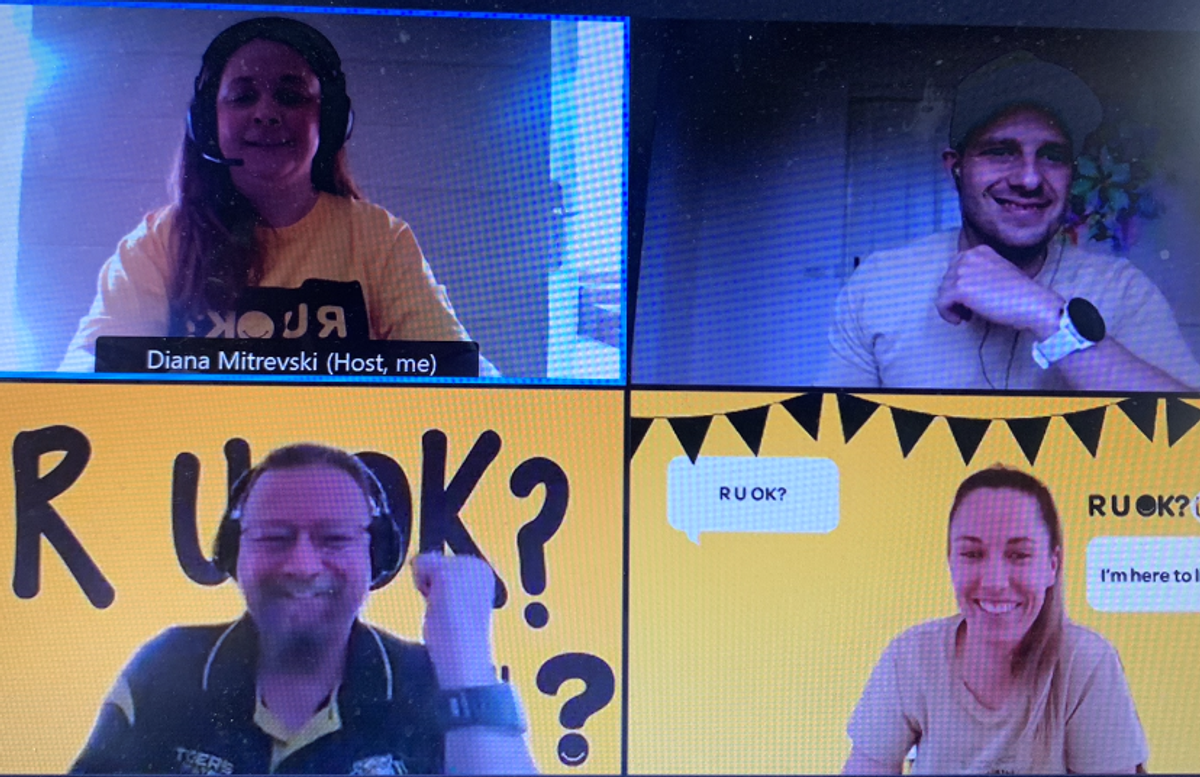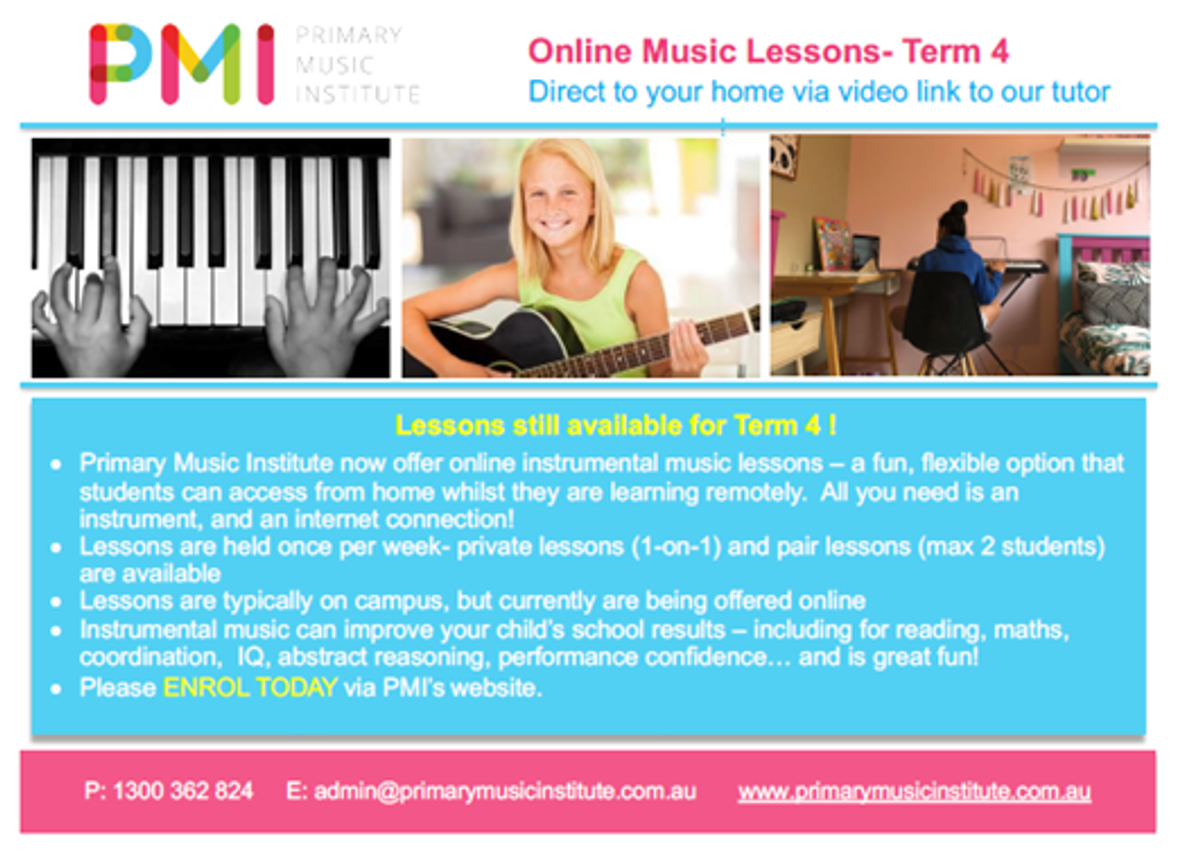School Information
General Office
Office Hours: 8.30am to 4.30pm
Telephone: (03) 9404 4311
Email:
plenty.parklands.ps@education.vic.gov.au
School Website:
www.plenty.parklands-ps.vic.edu.au
Term Dates
Term 4
4th October - 17th December
R U OK DAY
The key focal point is R U OK? Day, which is held once a year. The objectives of the project are to: Promote awareness of mental health and suicide and encourage Australians to reach out to those at risk in their community.
Our year 6 teachers supported R U OK day with their students on Thursday 9th September.
INDONESIAN LANGUAGE PROGRAM
‘Halo! Salam sejahtera semua!
Indonesian grammar is relatively simple, making it one of the easier languages to learn. This is because Indonesian does not require conjugation of verb tenses or participles, plural forms, articles and gender distinction for the third person pronouns. Indonesian is written using the Latin alphabet. It is more phonetically consistent than many languages—the correspondence between sounds and their written forms is generally the same, making it an easy language to learn.
At Plenty Parklands Languages (Bahasa Indonesia) is taught through two dimensions:
- Communicating in a language other than English.
- Intercultural knowledge and awareness.
In year Prep and One
- Students learn Indonesian for a semester covering basic greetings and introducing themselves in Indonesian.
- They also learn to sing Indonesian songs and play village games as part of their intercultural knowledge and awareness component of the curriculum.
In year Two, Three and Four:
- Students study language through themes and topics that introduce students to the idea that many societies and people within Australia normally use languages other than English for communication.
- The dimensions are integrated to provide opportunities for students to exchange information and ideas based on the theme and topic, and the individual student’s language competence at this level.
In year Five and Six:
- Students build language cumulatively by expanding language and cultural understandings they already have.
- The awareness that languages other than English are the normal means of communication for many societies and people is reinforced.
- Themes and topics are selected and sequenced to allow learners to build new skills, knowledge and attitudes and are culturally, socially and linguistically appropriate for Indonesian.
- Topics learnt at this level are familiar and interesting to students to encourage engagement. They may be productively integrated with themes, topics, or key areas being addressed in other areas of the curriculum.
- Teaching activities are diverse and aim to consolidate language and cultural understandings.
MAGPIES
Magpies
The magpie will only attack when protecting their nest, eggs or young from potential threats, especially during nesting time in October and November.
As native birds, magpies are a fully protected species so we should try to respect their needs.
Nests can be located in your garden, a park or the schoolyard. Magpies prefer a broad area of short grass with scattered tall trees for nesting and a nearby source of water.
If a magpie feels threatened, it can attack by swooping, or hovering around you and clacking its beak. Most of this behaviour is a form of a bluff, designed to scare, and the bird rarely intends to actually strike.
In a strike attack, a magpie usually swoops, hovering momentarily and then strikes. The fluttering of wings as the bird hovers can be a warning to duck and avoid an attack.
Avoiding magpie attacks
You can help to avoid a magpie attack by following these steps:
- do not interfere with, or destroy, eggs or nests
- try to stop children and others interfering with magpies
- wear a hat while working or playing in the backyard and garden to deter magpies and protect you from a strike by the bird
- watch the magpie, or pretend to watch it by painting eyes on your hat, or by wearing sunglasses backwards
- wave a hat for example to cause the magpie to retreat
- stand your ground after being swooped and glare at the bird confidently to make it retreat to a nearby tree (this action is not recommended for children)
- avoid showing your fear as magpies can sense it and will continue to attack
KEYBOARD LESSONS
CHILDREN 12 AND OVER CAN GET A COVID-19 VACCINE
Free and safe COVID-19 vaccines are currently available for everyone aged 12 years and over.
People who turn 12 during the COVID-19 vaccine rollout will be able to get vaccinated if they meet criteria for vaccination at that time.
Providing consent for children
Anyone who gets vaccinated must provide appropriate consent. Consent can be provided verbally.
A child’s parent or guardian can attend the vaccine appointment with them.
How to book a COVID-19 vaccine
You must book a vaccine appointment for your child.
For COVIDSafe reasons, only one parent or guardian can attend a vaccination appointment with a child.
More than 200,000 doses will be administered at vaccination centres each week between 16 August and 19 September 2021, with all centres operating with extended hours.
You must book an appointment to get your vaccine. You can book online or by calling 1800 675 398. For an interpreter, press 0.
Always stay COVIDSafe
Vaccinated or not, always be COVIDSafe. This will keep yourself and your friends, family and loved ones safe. Follow these COVIDSafe guidelines:
- Wash your hands with soap and water often or use hand sanitiser when you can’t wash your hands
- Keep 1.5 metres distance from other people
- Wear a face mask when required
- Cough and sneeze into a tissue or your elbow
- Follow current public health restrictions.
- Get tested for COVID-19 and stay home until you receive a negative result if you:
- feel even a little unwell
- have been to an exposure site
- have been in close contact with someone who might have COVID-19.
Don’t go to a vaccine appointment if you think you may have COVID-19.
What to bring with you to your vaccine appointment
Bring these things, if you have them:
- a face mask
- any emails about your vaccination appointment (on your phone or printed)
- photo identification, if you have one, such as a passport or driver’s licence
- a Medicare card or Individual Healthcare Identifier number, if you have one. If you don’t, that’s ok.
Consider other vaccines you are getting
Try to space your COVID-19 vaccine at least 7 days away from other vaccines, such as the influenza vaccine. Vaccines can be spaced closer together if:
- there are outbreaks of diseases like COVID-19 or flu
- it’s difficult to schedule your doses 7 days apart.
Talk to your doctor about specific allergies, or if you have questions
Talk to your doctor or regular health professional if you have concerns about your health and getting a COVID-19 vaccine.
You cannot consult a doctor on-site at a COVID-19 vaccine centre. If you have any questions or concerns, we encourage you to seek advice from you GP before you go to your vaccination appointment at a vaccine centre. Tell your doctor or regular health professional if you:
- are allergic to ingredients such as polyethylene glycol (PEG) (in Pfizer) or polysorbate 80 (in AstraZeneca)
- have had an allergic reaction to a previous dose of a COVID-19 vaccine or to an ingredient of the vaccine
- have had anaphylaxis (a severe allergic reaction) to other vaccines or other medicines.
If you have any of the above, you can still get a COVID-19 vaccine, but you must tell the immunisation provider beforehand. You will be asked to wait for 30 minutes after your vaccination to make sure you’re okay.
Vaccines are delivered by trained professionals who have medications and equipment on hand to respond to any issues.
Make sure your Medicare details are up to date.
If you don’t have a Medicare card
COVID-19 vaccines are free for everyone. The vaccines are safe, voluntary and free for everyone. This includes people who don’t have a Medicare Card, refugees, people seeking asylum, temporary and provisional visa holders (including international students and temporary migrants).
- If you do not have a Medicare card, you can apply for an Individual Healthcare Identifier (IHI). You do not need an IHI or a Medicare card to get a COVID-19 vaccine at a vaccination centre.
- An IHI or Medicare card will enable you to book a COVID-19 vaccine appointment.
- Individual Healthcare Identifiers are used to match the correct record to the person being treated - no clinical information is linked to the identifier.
- Applying for an Individual Healthcare Identifier and being vaccinated for COVID-19 will not impact your visa status or your eligibility for government payments.
BOOK YOUR SECOND DOSE
If this is your first vaccine, book an appointment or set yourself a reminder to get your second COVID-19 vaccine dose at the recommended interval.





